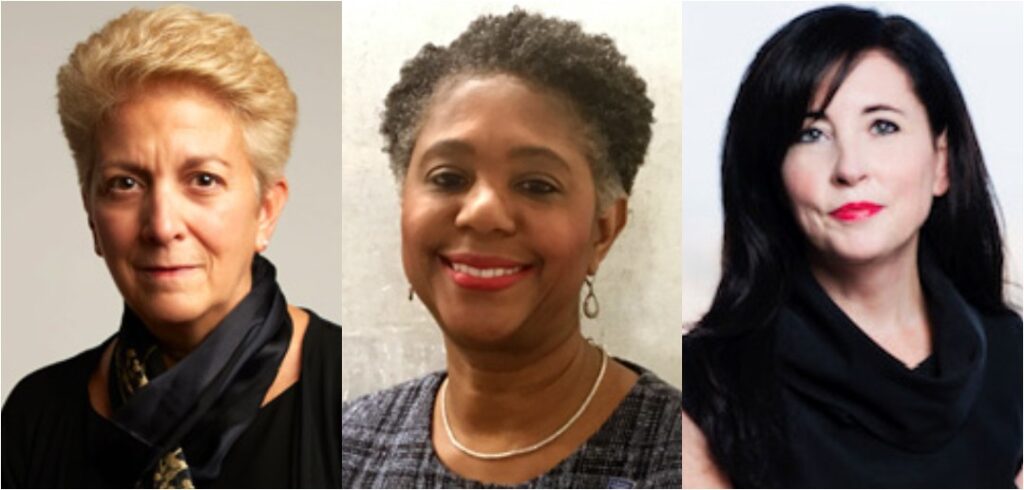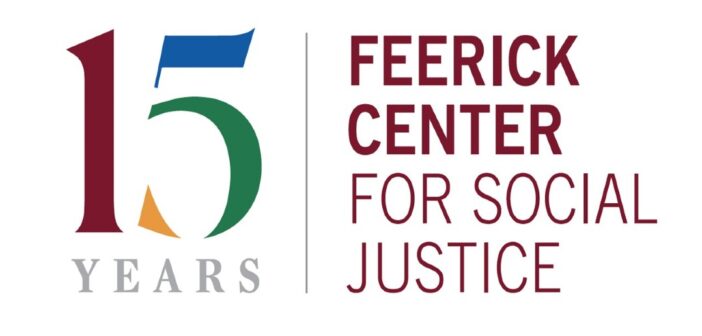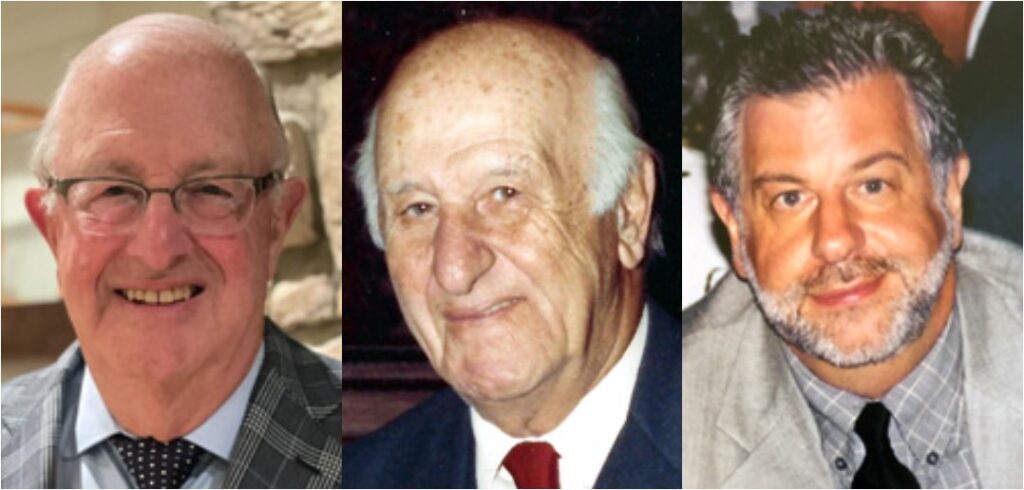The Feerick Center for Social Justice had much to celebrate on Oct. 18 as it marked its 15th anniversary and recognized esteemed leaders in the legal profession from the Fordham Law School community.
The Feerick Center was established in 2006 as a permanent legacy of the Law School’s centennial by former Dean William Michael Treanor. It honors Professor John D. Feerick ’61, his predecessor as Dean, for his deep commitment and passion to instill excellence and work “in the service of others” in legal education and practice. Since then, leaders in the Feerick Center have strived to advance social and economic justice, expand access to justice, and promote educational equity.
“Fifteen years later, our Center has exceeded my expectations in so many ways and, I believe, has truly fulfilled that original vision,” Dean Feerick said in his opening remarks during this year’s hour-long virtual awards and benefit reception. “I’m immensely proud of our Center’s ability to leverage partners, volunteers, attorneys, and students to meet the challenges of the day and make positive differences in the lives of people.”
“For the last 15 years, the Center has inspired, served, enlightened, convened, agitated and facilitated—always for the greater good and always to make meaningful contributions to people, community, and communities,” added Father Joseph M. McShane, S.J., Fordham University’s president who has driven Fordham’s expansive Jesuit mission and vision for the past 18 years. “All of us here at Fordham, and especially at the Law School and the Feerick Center, thank John [Feerick] for the inspirational example he sets for us every day.”
The Feerick Center’s Ever-growing and Everlasting Impact
The annual awards and benefit reception provides crucial funding for the Feerick Center, which provides educational and experiential opportunities for students to work to advance social justice.
“It’s precisely the kind of work that the Feerick Center at Fordham Law does each and every day that inspires me and gives me hope,” said Jennifer Jones Austin ’93, the host of this year’s benefit and CEO and executive director of FPWA (Federation of Protestant Welfare Agencies), an anti-poverty policy and advocacy nonprofit with 170 member organizations.”Fordham Law is an example of the power of communities working together—student groups, nonprofits, legal service providers, and public sector agencies to affect lasting sustainable change.”
The breadth and depth of the Feerick Center’s programs and initiatives include:
- Remote Civil Legal Assistance Resource Office (CLARO) Programs: 1,300+ volunteers, 38,000+ hours served, and 24,000+ consultations conducted to assist consumer creditors in civil court since 2008.
- New York State Attorney Emeritus Program: Instrumental in matching skilled senior lawyers with virtual pro bono legal services opportunities throughout the state to deliver critical civil legal services to New Yorkers in need throughout the pandemic. Since 2010, nearly 4,500 senior volunteers have enrolled and 10,000+ hours have been volunteered annually in recent years.
- Feerick Center Immigrant Justice Project: 8,000+ asylum seekers assisted, 200+ volunteers, and 20+ week-long service trips to the U.S.-Mexico border and the country’s largest detention center in Dilley, Texas, since 2016/pre-COVID-19.
- Feerick Center Veteran Rights Project: Delivered virtual know-your-rights presentations to veterans. More than 2,000 pro bono lawyers, law students, and service providers have been trained since 2012 and 300+ veterans have served since 2018.
Honorees Shine in the Spotlight
The careers of six Fordham Law alumni were celebrated, including the legacy of the LaSala family, which has deep ties to the Law School and an even deeper sense of service to the community. Dean Feerick bestowed the Feerick Center’s Spirit of Service Award upon A. Stephen LaSala ’40 and his wife, Helen A. LaSala, posthumously, which was accepted on their behalf by their sons Stephen R. LaSala ’70 and Thomas E. LaSala ’78. The LaSala’s philanthropy helped secure departmental chairs, academic programming, and scholarships, propelling the Law School’s rise to national prominence.
All of this year’s honorees exemplify a deep and life-long commitment to serve others in their work and promote the integrity and dignity of every person while giving back to their community and Fordham through their work. “They all reflect what is best about Fordham Law School in their lives and work,” Dean Matthew Diller said.
Dean Diller presented the Champion of Justice Award to William M. Hartnett ’79 of Cahill, Gordon & Reindel LLP. Over his 40-year-long legal career, Hartnett has distinguished himself as a top lawyer and trusted adviser to leading commercial and investment banking firms as well as public and private companies. Throughout his tenure as chair, and particularly during the pandemic, Hartnett has prioritized the work of the firm’s pro bono program.
Dora Galacatos ’96, executive director of the Feerick Center for Social Justice, also presented a Champion of Justice Award to her fellow classmate, Artemis Anninos ’96 who serves as Cahill, Gordon & Reindel’s first dedicated full-time pro bono counsel. Anninos’ focus and work has been primarily geared toward helping those most urgently in need throughout the pandemic—domestic violence survivors, New York City public school students without access to technology, and struggling small business owners.
Nitza Milagros Escalera, assistant dean emerita of student affairs at Fordham Law, presented the Honorable Deborah A. Batts Life of Commitment Award to Rhonda Cunningham Holmes ’97. Holmes currently serves as the executive director of Legal Counsel for the Elderly, an affiliate of AARP—working to ensure the integrity and quality of life for individuals compromised by discrimination, age, poverty, housing instability, or other challenges.
“Sitting on my desk today is a cube I received during the Law School’s 100th anniversary celebration, [which]states ‘In the service of others.’ Those five words are the thread that ties me to Judge Batts, to Fordham Law, and to the work I do,” Holmes said. “I hope that my work and service encourages others—especially students—to make service part of their work and part of who they are.”
Former Assistant Dean Robert J. Reilly ’75 presented Dr. Laura A. Coruzzi Ph. D. ’79, J.D. ’85 with the Spirit of Service Award. Coruzzi, senior vice president of intellectual property at REGENXBIO (an innovative clinical-stage biotech company), holds four Fordham degrees—both a bachelor’s and master’s in biology, a Ph.D. specializing in cell biology, and a J.D. degree from Fordham Law. She has been a supporter of the goals and aspirations of the Feerick Center and in particular the Center’s Immigrant Justice Project.
“When the terrible events separating children from their families unfolded at our border, I was appalled and wanted to help in some way,” Coruzzi said. “The Feerick Center allowed me to contribute in areas outside my field of expertise to help those poor immigrant families and desperate asylum seekers, and at the same time, offer opportunity, training and experience for the young new lawyers emerging from the Feerick Center incubator.”
Karuna Patel, deputy director of the Feerick Center for Social Justice, presented the James F. Gill Spirit of Hope Award to Maura K. Monaghan ’96. Monaghan has served on the Feerick Center’s advisory board since 2013. She is a partner at Debevoise & Plimpton and is co-chair of the firm’s Commercial Litigation Group and Healthcare & Life Sciences Group.

(L-R) Dr. Laura A. Coruzzi Ph. D. ’79, J.D. ’85; Rhonda Cunningham Holmes ’97; and Maura K. Monaghan ’96
A Bright Present and Promising Future
The 2021 Virtual Benefit exceeded its fundraising goal, thanks to donors’ contributions. Those interested in still making a gift can do so online.
Looking ahead to the next 15 years, the Feerick Center intends to elevate its work with a sharp focus on racial justice and community-based lawyering.
“These efforts will engage community members to learn how the Feerick Center can best respond to their needs,” said Lauren Kanfer, associate director of the Feerick Center for Social Justice. “The Feerick Center will also continue to engage law students, volunteers, and stakeholders in direct collaboration with the communities it serves to advance access to justice and promote equality.”






